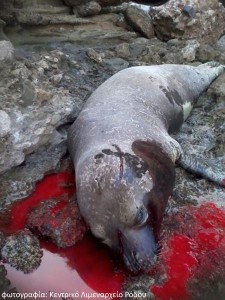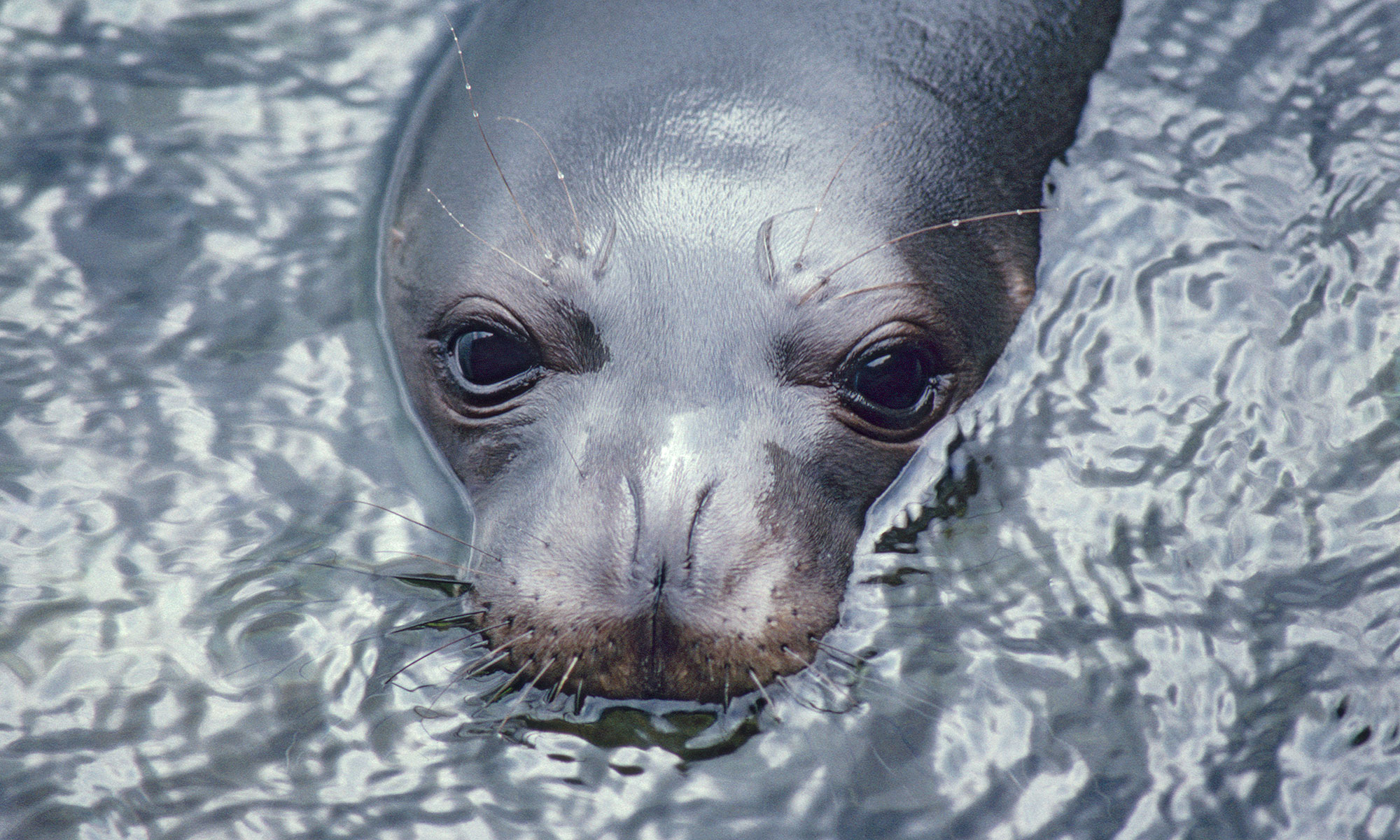MOm/Hellenic Society for the Study & Protection of the Monk Seal, 7 December 2011
 On Tuesday December 6, the Port Police of Rhodes and the Dodecanese Fisheries Director and President of the Management Body of the Protected Area Karpathos-Saria, Ms. Fotaki Marigo, informed MOm of a dead monk seal on the Karavola islet southwest of Rhodes.
On Tuesday December 6, the Port Police of Rhodes and the Dodecanese Fisheries Director and President of the Management Body of the Protected Area Karpathos-Saria, Ms. Fotaki Marigo, informed MOm of a dead monk seal on the Karavola islet southwest of Rhodes.
On the same day, the Security Chief of the Port Police of Rhodes, Mr. Vasilis Milathianakis, and volunteers from the Free Diving Association of Dodecanese-Rhodes, went to the site to confirm the incident and collect information and data. In consultation with the Director of MOm’s Rescue and Information Network, Ms. Marianna Psaradellis, all necessary arrangements were made for the collection of samples, since the area is remote and transport of the animal was not possible.
Today, Wednesday, December 7, MOm biologist, Psaradellis, went to Rhodes in order to examine the samples and give a testimony to the competent authorities. From the observations, descriptions, images, data and samples collected, it has been determined that: the seal was an adult male in good nutritional status (length of over 2.5meters and weighing 300 kilos). The animal bore head injuries from a hunting rifle and had been shot with 2 bullets (those used to hunt wild boar). Justice for this incident will be sought, as the Rhodes Port Authority is conducting an investigation and has informed the designated prosecutor.
We appeal to anyone who has information about the incident to contact the Rhodes Port Authority (tel. 22410 28666) or the Port Police (tel. 108).
Unfortunately, there have been 6 confirmed cases of deliberate killing of Mediterranean seals so far this year, in different regions of the country. Intentional killing remains one of the main threats to the survival of the species in the Mediterranean. International, European, EU and national legislation such as:
- Presidential Decree 67/81 (for the protection of flora and wildlife)
- Greek Law 1650-1686 (for the protection of the environment)
- The EU Directive 92/43 (for the conservation of natural habitats and of wild fauna and flora)
strictly prohibit, not only killing, but even the disturbance of these animals. The monk seal is the number one endangered marine mammal in Europe, and the largest population in the world lives and breeds in our country. MOm continues its efforts for the rescue and survival of the species by all legal means available.
We appeal to local communities to condemn these incidents and end these kinds of practices and behaviours. Unfortunately, the irresponsible actions of a small minority of unscrupulous individuals may cause the loss of monk seals in our country. We must not tolerate these crimes.
We want to thank the Rhodes Port Authority, namely the Security Chief, Vasilis Milanthiakis and the Free Diving Association of the Dodecansese who supplied their boat and specifically, Vasilis Houlis and Theodoris Froumis, for their valuable contributions and support.
Source: Monk seal shot to death in Rhodes! MOm/Hellenic Society for the Study & Protection of the Monk Seal, 7 December 2010.

Dear Editor,
keeping a gun on a fishing vessel is against the Greek law. Killing a monk seal without a gun is very difficult, and a great deal of seal killings would not happen if the law were enforced. Greece should be urged to actively and constantly enforce the ‘no guns aboard’ law. Unfortunately, it is my understanding that no such enforcement is done.
The responsibility of the failed recovery of monk seals in Greece rests therefore in large part on the Government of that country. I think that the Minister of the Environment should be reminded of this responsibility.
I thoroughly agree with G. Notarbartolo di Sciara’s suggestion. It is a scenario that appears totally anachronistic. Could we consider organising a public-petition to be signed by the scientific and conservation community directed to the Ministry of the Environment and other respective authorities requesting that legal enforcement be urgently undertaken in this respect?
I think this is a good idea, and welcome suggestions concerning its implementation. However, for best results enforcement should be accompanied by awareness and involvement programmes, in order to combine top-down and bottom-up approaches. Furthermore, a petition should be the occasion for giving to Greek and European decision makers an image of unity. Previous divisiveness in the monk seal conservation community has played in the hands of politicians looking for excuses for inaction.
I fully agree with both Giuseppe Notarbartolo’s and Giulia Mo’s comments and suggestions. And it is very sad that no official reactions ever appear and no real measure is ever implemented not only at national level in Greece, but also at local level. Seals have a strong appeal for tourists, and tourism is one of the few good resources left to Greece in these hard times…
Sono d’accordo con Luigi Guarrera, non esistono reazioni ufficiali sul fatto di Rodi, ma anche su altri fatti. Gli unici che hanno scambiato impressioni su questi argomenti sono un gruppo di Italiani che scrivono in inglese ( tranne me e non si capisce poi per chi lo facciano ). Sembra che importi poco a troppi, ma dove sono finiti gli studiosi Turchi, Greci, Spagnoli, Portoghesi…. sempre pronti a dispensare pillole di saggezza nei convegni? La cosa mi rattrista non poco.
Ministry of Environment is probably the stakeholder responsible for conducting programs pivoting around awareness and involvement, although I believe that the actual enforcement of the “no guns aboard” law is in the hands of the public authority which patrols the seas and the correct behaviour involving fishing operations. I would suppose this task rests in the Coast Guard or some form of maritime police so the public authority (Ministry of Maritime Affairs or analogous?) responsible for this task should be addressed as well. A strong program of enforcement in my opion requires that a program of action be undertaken by which controls are carried out (which implies management of human resources which carry them out) and there is a resulting action in the case of the non-respect of the ban. Another thing to verify is what are the sanctions in the case of the non-respect of the ban. Does the law foresee an administrative penalty (fine) or other measures like arrest? Or does the law not foresee any of these two at all? If a petition is drawn up it should request that specific measures are undertaken. so in the overall it should request:awareness, involvement programs, detailed plan of control on the territory and adequate response measures in the case of non-compliance. Seems like one would need national experts to clarify exactly how this should be done.
Tanti Auguri a Tutti i sostenitori delle attività che sostengono e proteggono la Foca Monaca.